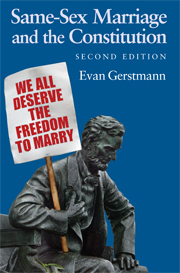Book contents
- Frontmatter
- Contents
- Acknowledgments
- Preface to the Second Edition
- PART I THE CHALLENGE OF SAME-SEX MARRIAGE
- 1 Introduction
- 2 Reason and Prejudice: Is the Heterosexual Monopoly on Marriage Rational?
- 3 Looking for Stricter Scrutiny: Sexism, Heterosexism, and Class-Based Equal Protection
- PART II MARRIAGE AS A FUNDAMENTAL CONSTITUTIONAL RIGHT
- PART III RIGHTS AND EQUALITY
- PART IV RIGHTS IN A DEMOCRATIC SOCIETY
- Bibliography
- Index
3 - Looking for Stricter Scrutiny: Sexism, Heterosexism, and Class-Based Equal Protection
Published online by Cambridge University Press: 05 September 2012
- Frontmatter
- Contents
- Acknowledgments
- Preface to the Second Edition
- PART I THE CHALLENGE OF SAME-SEX MARRIAGE
- 1 Introduction
- 2 Reason and Prejudice: Is the Heterosexual Monopoly on Marriage Rational?
- 3 Looking for Stricter Scrutiny: Sexism, Heterosexism, and Class-Based Equal Protection
- PART II MARRIAGE AS A FUNDAMENTAL CONSTITUTIONAL RIGHT
- PART III RIGHTS AND EQUALITY
- PART IV RIGHTS IN A DEMOCRATIC SOCIETY
- Bibliography
- Index
Summary
We have seen that because the rational basis test is so deferential to the legislative branches, the same-sex marriage ban can most likely survive a rational basis challenge. Further, we will see shortly that the Court has been unwilling to apply heightened scrutiny to laws that discriminate against gays and lesbians. As a result, advocates of same-sex marriage appear to be caught between the proverbial rock and hard place. So far, only the high court of Massachusetts has found a right to same-sex marriage in the state constitution.
Yet this is not the end of the debate. In the early 1990s a new idea emerged. Like alchemists turning lead into gold, these advocates have, with some success, metamorphosed claims of discrimination against gays and lesbians into gender discrimination claims. Because the courts subject gender discrimination to a higher level of judicial scrutiny, the legal case against the same-sex marriage ban has the potential to grow much stronger under this approach.
The most prominent exponent of this approach is Andrew Koppelman. Although Koppelman would not agree that there is a rational basis for banning gay marriage, he recognizes the difficulty of proving the negative proposition that there is no rational basis for the ban.
Therefore a new strategy is required to pursue gay and lesbian rights claims. “If an argument were available that shifted the burden of proof to the state to justify discrimination against lesbians and gays, this might be a more strategically promising alternative for gay rights advocates.
- Type
- Chapter
- Information
- Same-Sex Marriage and the Constitution , pp. 48 - 70Publisher: Cambridge University PressPrint publication year: 2008



